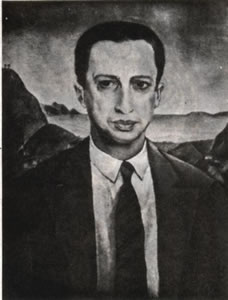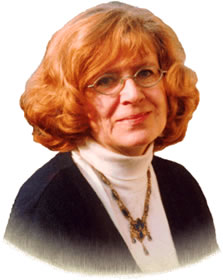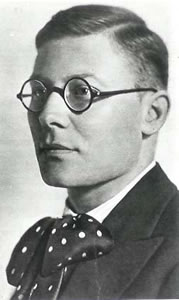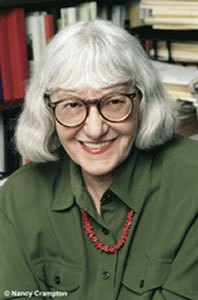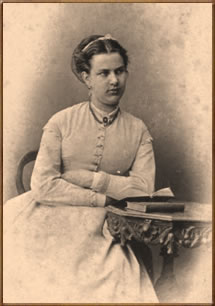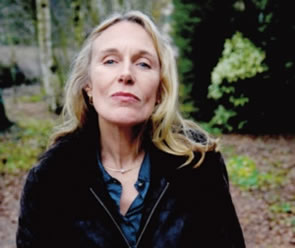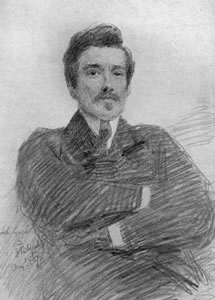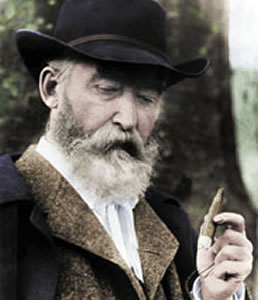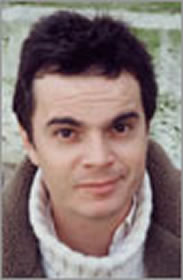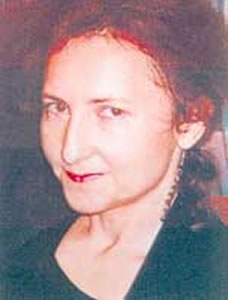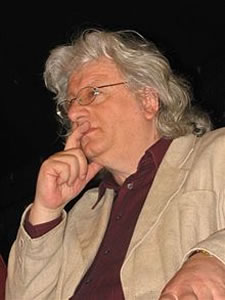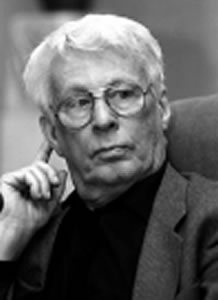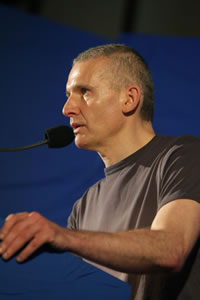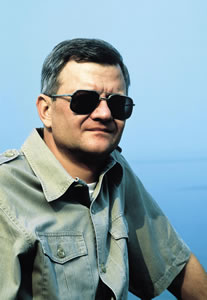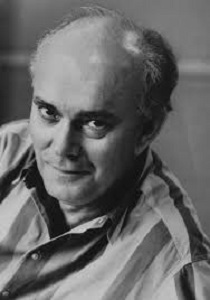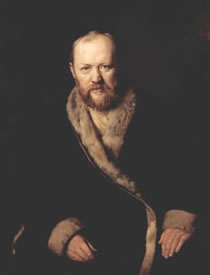De Nederlands dichter, toneelschrijver en essayist Martinus Nijhoff werd geboren in Den Haag op 20 april 1894. Zie ook mijn blog van 20 april 2007.
Ineengebroken
IV
Alleen God weet waarom ik bij je kwam,
Ik wist slechts dat ik niet kwam om te rusten,
Dat je mijn hart ziek en rumoerig kustte,
Dat onze nacht brandde als een zwarte vlam.
Wij, die boven de stad te dansen dorsten
Het licht langs, dat van niets naar niets steeds stijgt,
Vielen terug in ’t donker onzer borsten,
Waar voortaan één hart, schaduw-zalig, zwijgt.
Zoo lagen we in den laatsten dageraad,
Hand in hand, glimlachend tegen de zon
Die door ’t raam inkeek als een groot gelaat –
En ‘k voelde tranen in mijn ogen springen
En hoorde mij, toen ’t carillon begon –
Met vreemde stem een kinder-liedje zingen.
Impasse
Wij stonden in de keuken, zij en ik.
Ik dacht al dagen lang: vraag het vandaag.
Maar omdat ik mij schaamde voor mijn vraag
wachtte ik het onbewaakte ogenblik.
Maar nu, haar bezig ziend in haar bedrijf,
en de kans hebbend die ik hebben wou
dat zij onvoorbereid antwoorden zou,
vroeg ik: waarover wil je dat ik schrijf?
Juist vangt de fluitketel te fluiten aan,
haar hullend in een wolk die opwaarts schiet
naar de glycine door het tuimelraam.
Dan antwoordt zij, terwijl zij langzaamaan
druppelend water opde koffie giet
en zich de geur verbreidt: ik weet het niet.
Het souper
’t Werd stil aan tafel. ’t Was of wijn en brood
Werd neergeslagen uit den greep der handen.
De kaarsvlam hing lang-wapperend te branden
En ’t raam sprong open door een donkren stoot.
Als water woelden in den nacht de landen
Onder het huis; wij voelden hoe een groot
Waaien ons aangreep, hoe de wieken van de
Vaart van den tijd ons droegen naar den dood.
Wij konden ons niet bij elkaar verschuilen:
Een mensch, eenzaam, ziet zijn zwarte eenzaamheid
Dieper weerkaatst in de oogen van een ander —
Maar als de winden langs de daken huilen,
Vergeet, vergeet waar ons zwak hart om schreit,
Lach en stoot glazen stuk tegen elkander.

Martinus Nijhoff (20 april 1894 – 26 januari 1953)
De Nederlands schrijver en beeldend kunstenaar Jan Cremer werd geboren in Enschede op 20 april 1940. Zie ook mijn blog van 20 april 2007.
Uit: Ik Jan Cremer
“Ook ben ik een keer in slaap gevallen onder de preek. Want dat is ook de grootste flauwekul: je mag niks terugzeggen als zo’n priester tegen je schreeuwt: Gij zondaar, Gij zult branden op de Dag des Oordeels, want zeide niet Matthias toen m’n hem vroeg Zult Gij mij aan het kruis slaan? Voor den haan drie keer zijnen kraai heeft laten horen zal er een Zondvloed den aarde teisteren, waarop Petrus zijn Staf veranderde in een slang en de zwarte pest over Nazareth kwam tot het fiks begon te regenen waardoor een zondvloed (Den Fonck sloeg in Zeijn Kruys toen Hij Haer Voorbeij zag gaen) over de aarde kwam en er een zekere Noach, die wist waar ie de mosterd moest halen een bootje getimmerd had waardoor ie kon ontkomen (Noach wordt altijd ten onrechte voorgesteld als een groot dierenvriend. In feite heeft hij al dat vee meegenomen als proviand. Kon hij weten dat die regen zo gauw ophield?) Dat en al deze dingen zegt zo’n priester dan, hij wijst beschuldigend met de vinger naar je en roept: ‘Zondaar, sta op!’ wat moet je dan doen? Als je gaat staan wordt je door je buurman weer achterover getrokken: als je blijft zitten ben je een ‘vuile Farizeeër.’ Dus ga ik maar pitten.”

Rode Orkaan
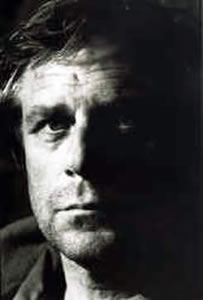
Jan Cremer (Enschede, 20 april 1940)
De Vlaamse dichter en schrijver Jozef Hugo Maria Deleu werd geboren in Roeselare op 20 april 1937. Zie ook mijn blog van 20 april 2007.
DE LANGZAME DOOD
Wie langzaam sterft
sterft meer dan duizend doden.
Van kindsbeen
hoort hij in ’t hoogseizoen
van gaan en komen
de voortgang van de nietigheid.
Wie langzaam sterft
is levenslang in stervensnood.
Raam
Er zou een wereldkampioenschap moeten
zijn: om ter meest bewuste
nu’s in een vandaag, momenten die
er werkelijk toe – meetbaar met
elektroden op de hoofdhuid. En de winnaar wint
één minuut
gedurende de welke iedereen – behalve hij –
in comateuze slaap
één minuut bijvoorbeeld voor een raam staan
wetend: wereldwijd ben ik de allerenige die
voor een raam nu, één minuut alleenrecht over
heden

Jozef Deleu (Roeselare, 20 april 1937)
De Nederlandse dichter en vertaler Jean Pierre Rawie werd geboren op 20 april 1951 in Scheveningen. Zie ook mijn blog van 20 april 2007.
Bevlogen
Ik weet niet zeker of het zwanen waren,
een najaarsnanacht dat hun vleugelslag
in duizendvoud over het huis heen lag,
om pas tegen het daglicht te bedaren.
De hele dag liep ik als uitverkoren,
of ik door engelen was aangeraakt.
Maar hoeveel lege nachten zijn doorwaakt
waarin sindsdien geen wiekslag viel te horen?
Nu moet ik mij weer met de zon verzoenen
en, nooit meer zo bevlogen, wennen aan
het wassen en het slinken van de maan,
het komen en het gaan van de seizoenen.
No Second Troy
Ik heb een vrouw bemind, die best
een tweede Troje zou verdienen,
en die door drank en heroïne
onder mijn ogen werd verpest.
Tot ziekbed kromp het liefdesnest,
en ik zou zachtjes willen grienen,
omdat alleen dit clandestiene
sonnetje van ons tweeën rest.
Zo’n veertien regeltjes waarmee je
een tipje van de sluier licht,
wat zout om in de wond te wrijven.
Wat zijn dat toch voor waanideeën,
dat je, verdomd, in een gedicht
‘de dingen van je af kunt schrijven’?
Vervulling
Nu zelfs mijn natste jongensdromen
zo stuk voor stuk zijn uitgekomen,
besef ik hoe genadeloos
het leven mij heeft beetgenomen.
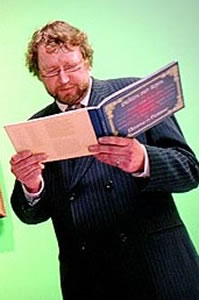
Jean Pierre Rawie (Scheveningen, 20 april 1951)
De Amerikaanse schrijver, essayist en criticus Steven Michael Erickson werd geboren op 20 april 1950 in Los Angeles. Zie ook mijn blog van 20 april 2007.
Uit: Zeroville
„On Vikar’s shaved head is tattooed the right and left lobes of his brain. One lobe is occupied by an extreme close-up of Elizabeth Taylor and the other by Montgomery Clift, their faces barely apart, lips barely apart, in each other’s arms on a terrace, the two most beautiful people in the history of the movies, she the female version of him, and he the male version of her.
2.
This is the summer of 1969, two days after Vikar’s twenty-fourth birthday, when everyone’s hair is long and no one shaves his head unless he’s a Buddhist monk, and no one has tattoos unless he’s a biker or in a circus.
He’s been in Los Angeles an hour. He’s just gotten off a six-day bus trip from Philadelphia, riding day and night, and eating a French dip sandwich at Philippe’s a few blocks up from Olvera Street, the oldest road in the city.
3.
There in Philippe’s, a hippie nods at Vikar’s head and says, “Dig it, man. My favorite movie.”
Vikar nods. “I believe it’s a very good movie.”
“Love that scene at the end, man. There at the Planetarium.”
Vikar stands and in one motion brings the food tray flying up, roast beef and au jus spraying the restaurant—
—and brings the tray crashing down on the blasphemer across the table from him. He manages to catch the napkin floating down like a parachute, in time to wipe his mouth.
Oh, mother, he thinks. “A Place in the Sun, George Stevens,” he says to the fallen man, pointing at his own head, “NOT Rebel Without a Cause,” and strides out.
4.
Tattooed under Vikar’s left eye is a red teardrop.
5.
Is it possible he’s traveled three thousand miles to the Movie Capital of the World only to find people who don’t know the difference between Montgomery Clift and James Dean, who don’t know the difference between Elizabeth Taylor and Natalie Wood? A few blocks north of Philippe’s, the city starts to run out and Vikar turns back. He asks a girl with straight blond hair in a diaphanous granny dress where Hollywood is. Soon he notices that all the girls in Los Angeles have straight blond hair and diaphanous granny dresses.
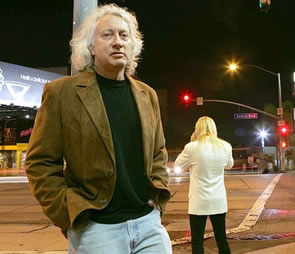
Steven Erickson (Los Angeles, 20 april 1950)
De Finse schrijver Arto Paasilinna werd geboren op 20 april 1942 in Kittilä in Lapland. Zie ook mijn blog van 20 april 2007.
Uit: Der wunderbare Massenselbstmord (Vertaald door Regine Pirschel)
„Der ärgste Feind der Finnen ist die Melancholie: Trübsal, grenzenlose Apathie. Schwermut lastet auf dem unglücklichen Volk, hat sich im Laufe der Jahrtausende alle Menschen des Landes unterworfen, sodass ihre Seele düster und ernst ist. Die Wirkung ist so verheerend, dass viele im Tod die einzige Rettung aus der Bedrängnis sehen. Das finstere Gemüt ist ein schlimmerer Feind als einst die Sowjetunion.
Die Finnen sind jedoch ein Volk von Kämpfern. Nachgeben gilt nicht. Ein ums andere Mal rebellieren sie gegen den Tyrannen.
Johannis, das mittsommerliche Fest des Lichtes und der Freude, ist für die Finnen wie eine gewaltige Schlacht, in der sie die zehrende Schwermut mit vereinten Kräften und gewaltsamen Mitteln zu bannen versuchen. Das ganze Volk macht am Vorabend von Johannis mobil: Nicht nur die diensttauglichen Männer, sondern auch Frauen, Kinder und alte Leute eilen an die Front. An Finnlands tausend und abertausend Seen werden riesige heidnische Feuer entfacht, um die Finsternis zu vertreiben. Blauweiße Kriegsfahnen werden an den Masten gehisst. Fünf Millionen finnischer Krieger stärken sich vor der Schlacht mit fettigen Würsten und gegrillten Schweinesteaks. Bedenkenlos trinken sie sich Mut an, und zu Akkordeonklängen marschieren die Truppen auf, um den Feind zu attackieren. In einem pausenlosen, die ganze Nacht währenden Kampf wird seine Macht gebrochen.“
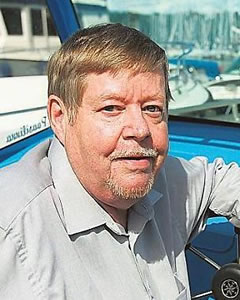
Arto Paasilinna (Kittilä, 20 april 1942)

